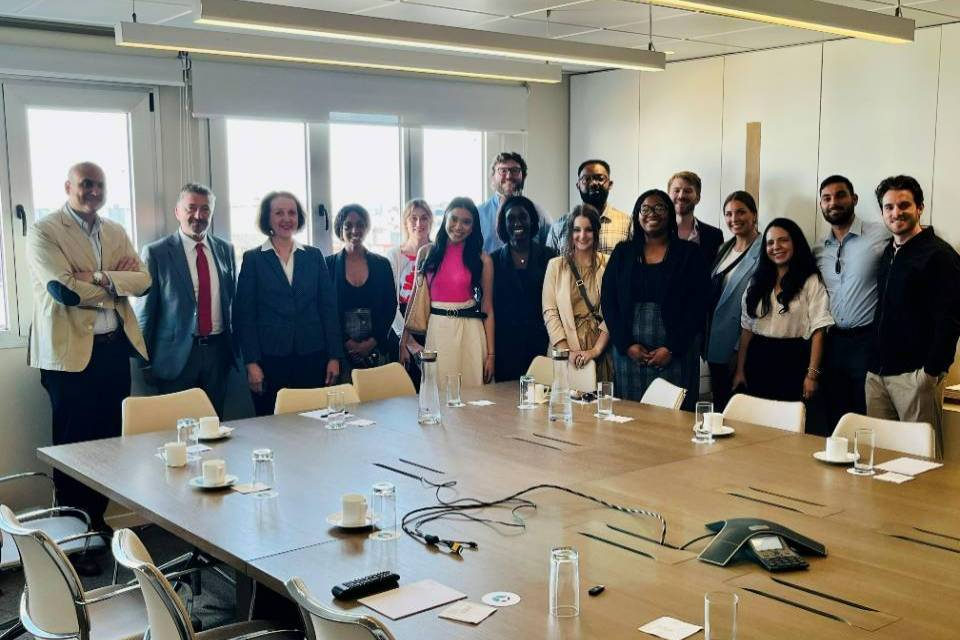Postcards from Madrid: Summer of 2023
Organized by the Center for International and Comparative Law, the Summer Law Program in Madrid is a six-week program at the Saint Louis University — Madrid campus that offers enriching, rewarding comparative and international law educational opportunities. Classes are taught by SLU LAW faculty, local attorneys and professors. Students are encouraged to experience all that the culturally rich city of Madrid has to offer.
Here you will find a few snapshots of what life is like for a law student in Madrid.
Constitutional Court Visit
LaTrese Robinson (Rising 3L)
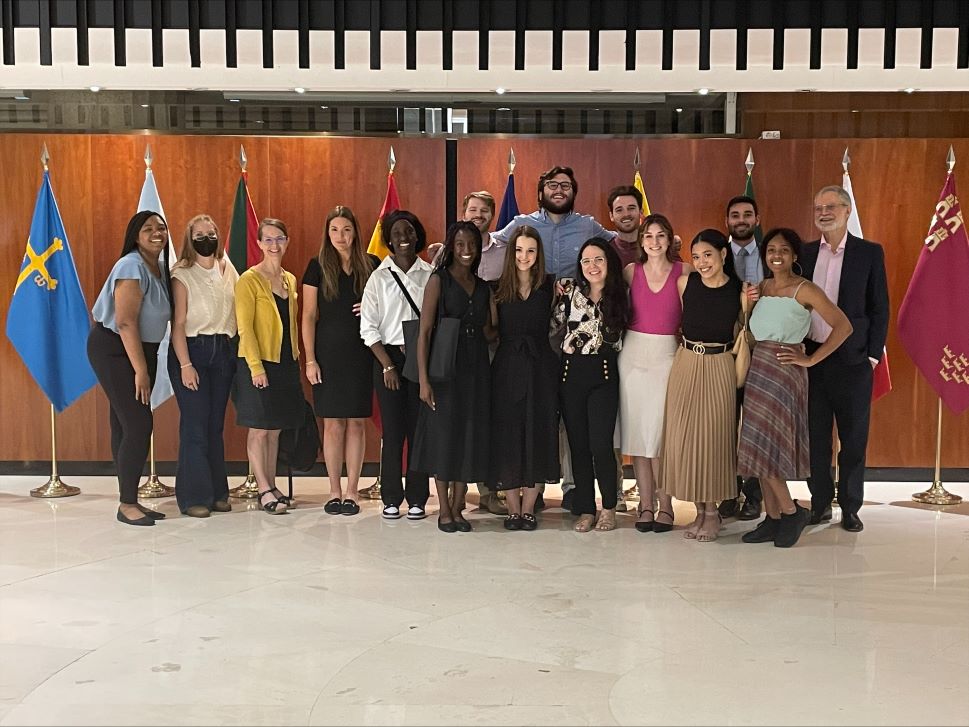 SLU LAW students in Madrid visited the Constitutional Court of Spain. Professor Ignacio
Borrajo Iniesta provided a tour filled with the history of the country and the court.
He has worked with the court for many years and shared a great deal of knowledge with
the students. Students saw various copies of Spain's constitutions. The latest constitution
signed in 1981 was passed primarily unanimously. There is a portrait of the judgment
of King Solomon that hangs in the hallway to remind its onlookers of justice.
SLU LAW students in Madrid visited the Constitutional Court of Spain. Professor Ignacio
Borrajo Iniesta provided a tour filled with the history of the country and the court.
He has worked with the court for many years and shared a great deal of knowledge with
the students. Students saw various copies of Spain's constitutions. The latest constitution
signed in 1981 was passed primarily unanimously. There is a portrait of the judgment
of King Solomon that hangs in the hallway to remind its onlookers of justice.
Most of the tour was spent in the court's hearing room, which differs in design from courtrooms in the U.S. The most notable difference was the seating arrangement for parties as they sat at the end of the bench rather than in front of it. It is also common for parties to sit during proceeding presentations.
The students learned about the history of Spain's judicial system. Judges were originally servants to the king when the judiciary was established in the 16th century and were appointed until the 19th century. The constitutional court system began in Austria and Spain established the third court in 1931 following the Czech Republic. Hitler dismantled these courts during WWII but they were reconstructed after the fall of dictator Francisco Franco. Spain has multiple courts, including civil, criminal, military, administrative and social. The country also has an appellate court, supreme court, and a constitutional court.
The career of a judge now begins after the passing of a state exam taken immediately after law school and training in Barcelona. There are about 5,000 judges in the country.
The experience was exceptional and an excellent way to see how other legal systems began and change over time.
Supreme Court Visit
Mark Buis (Rising 3L)
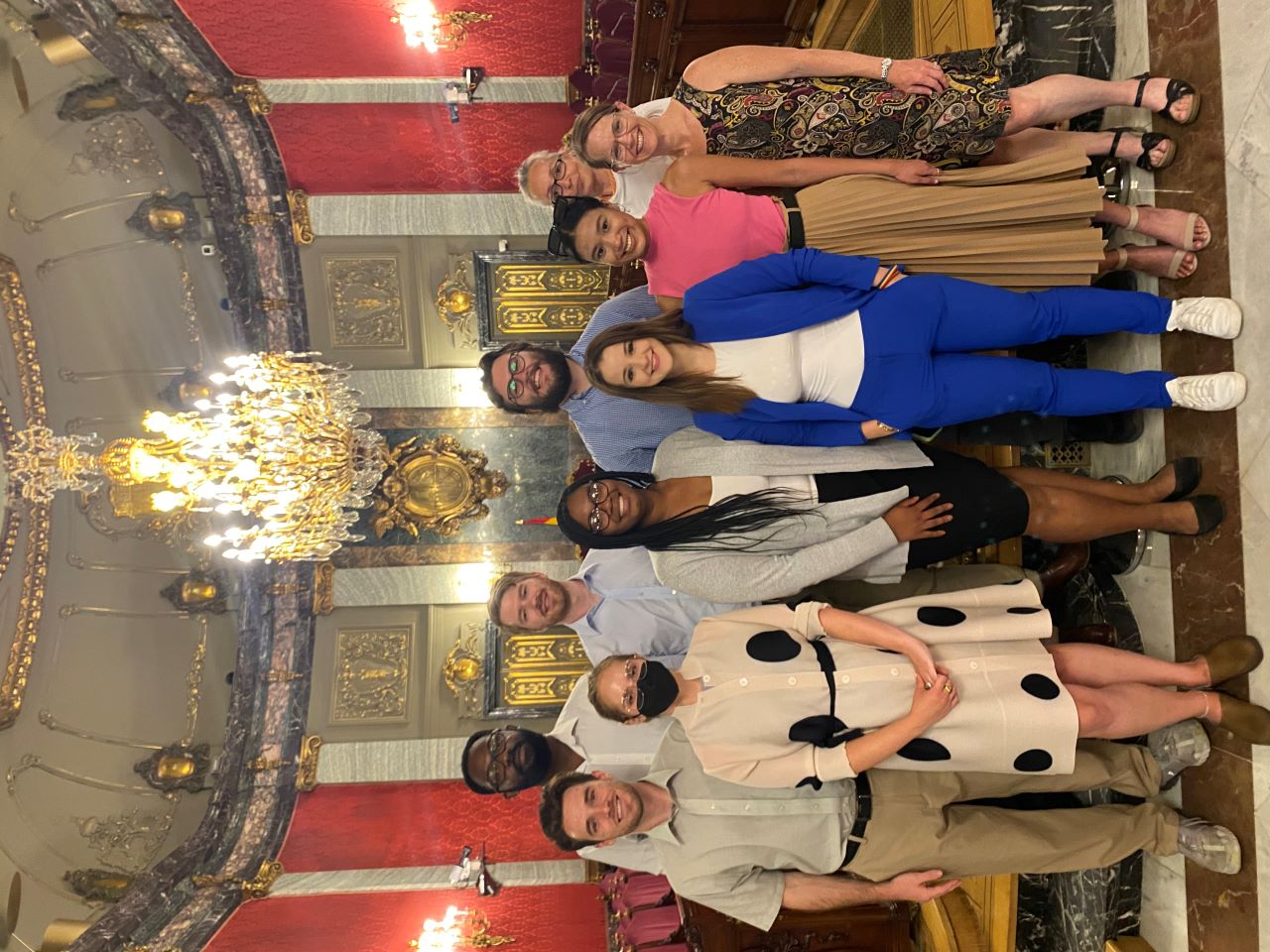 SLU LAW students were fortunate to tour the Supreme Court of Spain in Madrid with
Professor Lorena Bachmaier and Antonio del Moral, a former prosecutor and sitting
judge in the Criminal Law section of the Supreme Court. The court building was originally
constructed as a retirement residence for a queen and included a convent, and then
later became a court building, and then the Supreme Court. We were unable to tour
every courtroom because they were holding judicial examinations, but we got to see
the courtroom that held the trial of Castillian Independence conspirators, the only
televised court case in Spanish Supreme Court history. It was an incredible and informative
visit, and we are very grateful for being able to tour such a historically and legally
rich place!
SLU LAW students were fortunate to tour the Supreme Court of Spain in Madrid with
Professor Lorena Bachmaier and Antonio del Moral, a former prosecutor and sitting
judge in the Criminal Law section of the Supreme Court. The court building was originally
constructed as a retirement residence for a queen and included a convent, and then
later became a court building, and then the Supreme Court. We were unable to tour
every courtroom because they were holding judicial examinations, but we got to see
the courtroom that held the trial of Castillian Independence conspirators, the only
televised court case in Spanish Supreme Court history. It was an incredible and informative
visit, and we are very grateful for being able to tour such a historically and legally
rich place!
Madrid Walking Tour
Melissa Mann (Rising 3L)
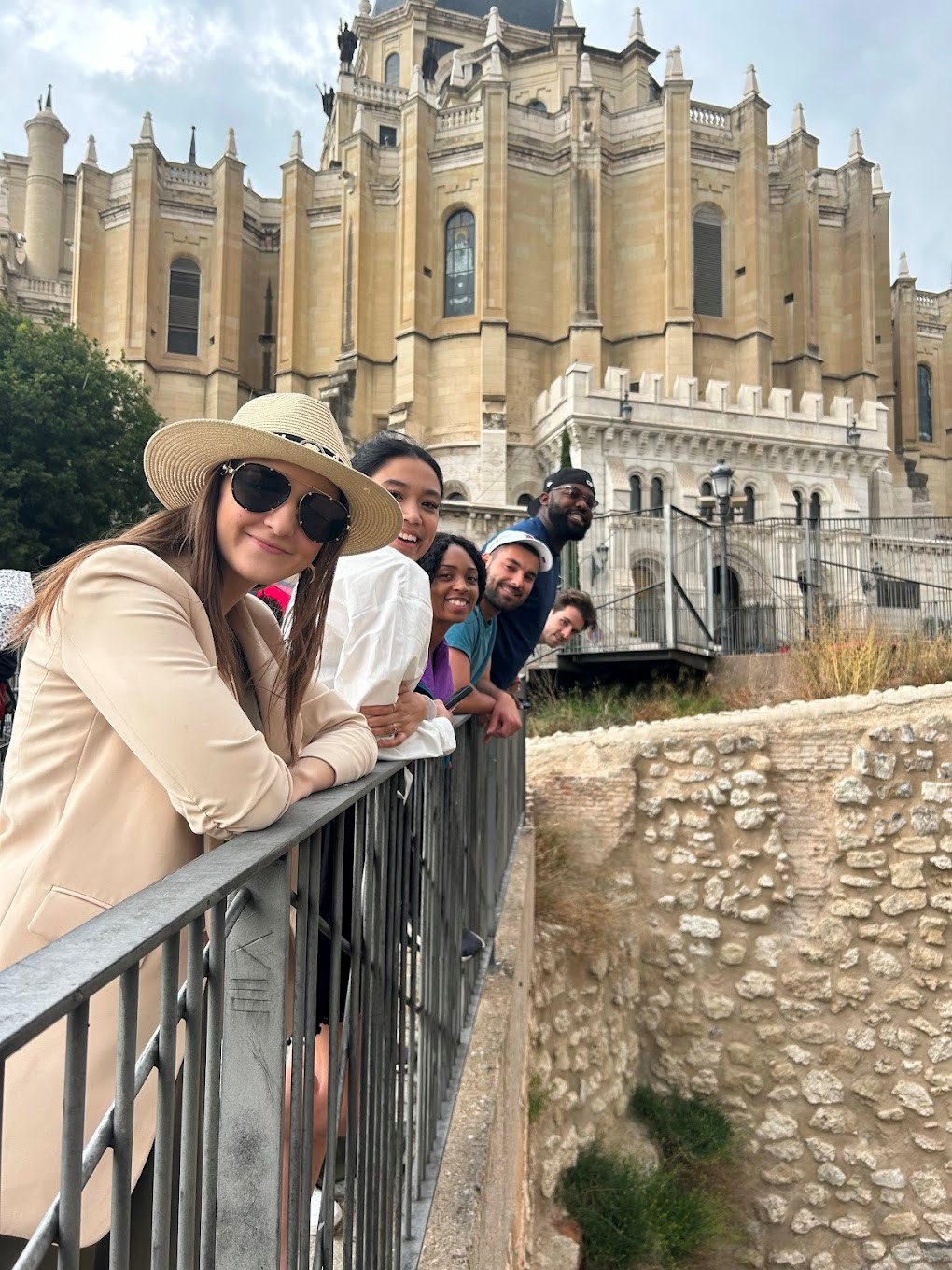
As law students, our study abroad trip to Spain was not only an opportunity to immerse ourselves in a new culture but also a chance to explore the rich history and vibrant atmosphere of Madrid. One of the highlights of our adventure was a captivating walking tour that took us through the iconic Plaza de Mayor, Plaza de España, and Plaza del Sol.
Our expert guide and Spanish teacher narrated the history behind the plazas, recounting stories of royal proclamations, lively festivals, and even bullfights that once took place within these hallowed grounds. As we strolled along the cobblestone streets, we couldn't help but imagine the vibrant past that unfolded here, serving as a gathering place for locals and visitors alike.
Our walking tour of Madrid's Plaza de Mayor, Plaza de España, and Plaza del Sol was an unforgettable experience that allowed us to connect with the rich history, culture, and spirit of Spain. It was not only an opportunity to take a break from our studies but also a chance to witness firsthand how the country's heritage has shaped its legal traditions and societal values. This walking tour provided us with not only a memorable adventure but also valuable insights that will undoubtedly enrich our legal education and future careers.
Real Madrid with Fr. Seixas Nunes
Ryan Dowd (Rising 3L)
On Tuesday, May 30, Professor Afonso Seixas-Nunes sponsored a tour of Bernabéu, the home of Real Madrid. The Bernabéu is an iconic cathedral of European soccer, or futbol.
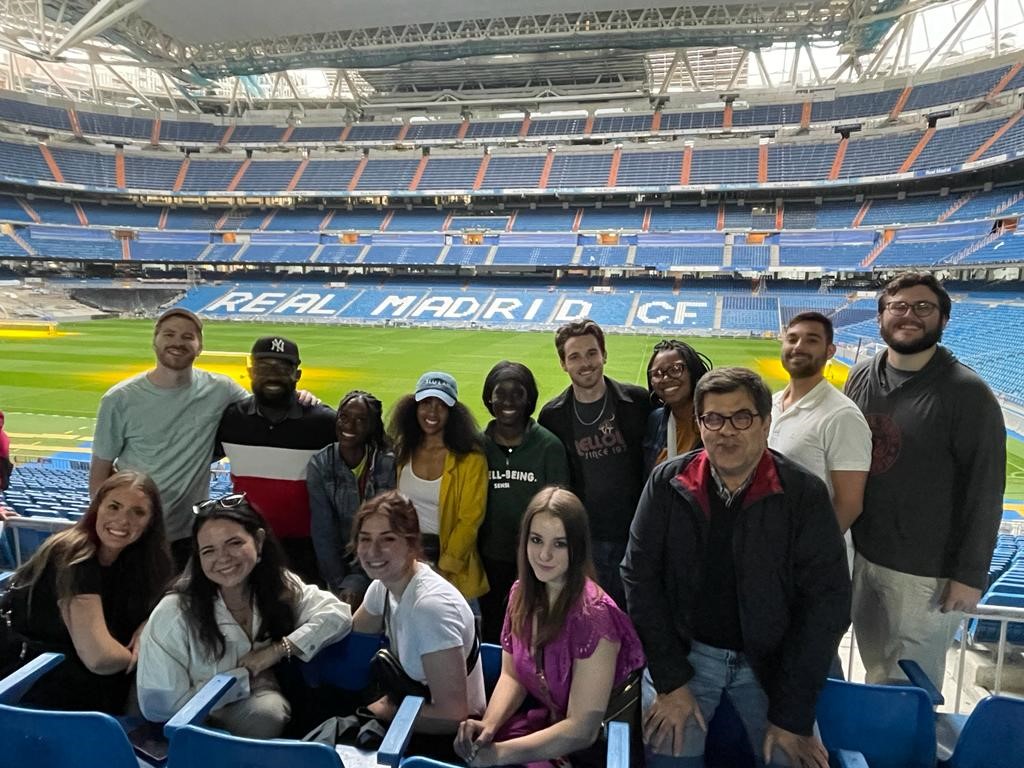 The tour took us through the Bernabéu Museum, which houses the club's legendary haul
of silverware. It's a museum that essentially says "winning isn't everything ... it's
the only thing." The museum displays Real Madrid's spoils from conquests in the Spanish
first division, Copa del Rey, and European competitions like the Champions League.
The tour took us through the Bernabéu Museum, which houses the club's legendary haul
of silverware. It's a museum that essentially says "winning isn't everything ... it's
the only thing." The museum displays Real Madrid's spoils from conquests in the Spanish
first division, Copa del Rey, and European competitions like the Champions League.
After the tour, Father Afonso and a friend — a local madrileño and supporting member of Real Madrid — took us to a local restaurant for dinner around 7:30 pm. This is quite early for a Spanish dinner, but our hosts were more than accommodating and ordered heaps of fried fish (including shark!) and other local Madrid fare.
A week and a half later, a few of us returned to the Bernabéu to watch the last home game of Real Madrid's season. We saw the final appearance and goal of legendary striker Karim Benzema's 14-year career at Real Madrid.
Squire Patton Boggs Law Firm Visit
The SLU Law Madrid Study Abroad Program visited the Madrid Squire Patton Boggs office and speak with two experienced international lawyers. Many of the visiting students are enrolled in a class covering global trade and investments, so it was such a great experience to be able to discuss relevant topics with lawyers who dealt with these issues daily within their profession. The lawyers shared their vast experience in international trade and negotiation from different perspectives, such as their specializations in litigation and drafting sanctions. They emphasized how recent history and developing technologies around the world greatly impact international trade, bringing in topics from current political affairs to blockchain technology.
We also had the opportunity to ask the lawyers questions and hear their viewpoints and advice. Questions ranged from practical advice on what a career in international law might look like to questions about the future of international law. It was extremely interesting to hear how many external factors affect international law, and it was a small taste of how international law requires more than just knowledge of the law. The visit heightened my excitement about the constantly evolving field of international law, and I look forward to seeing how the field changes and grows throughout the next years.
